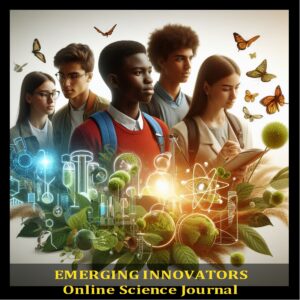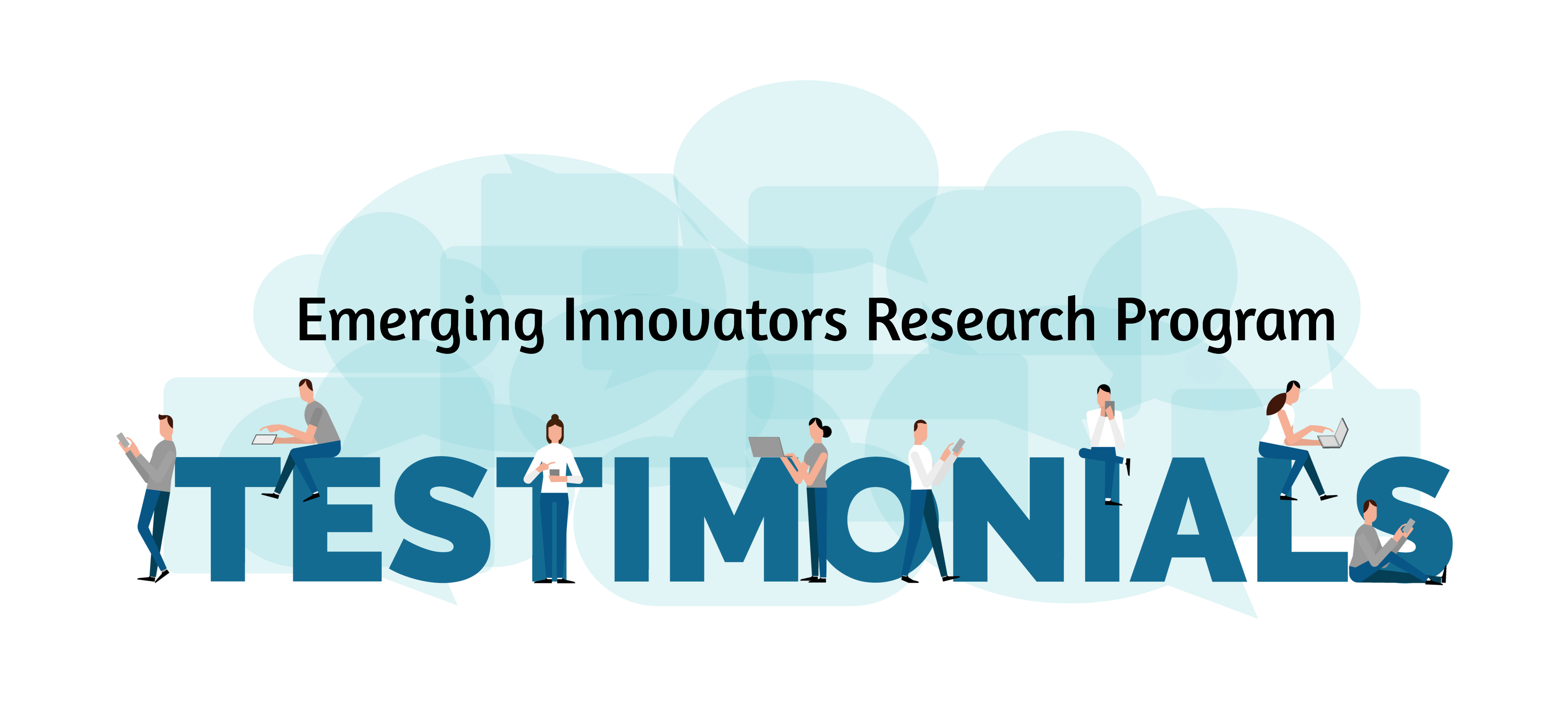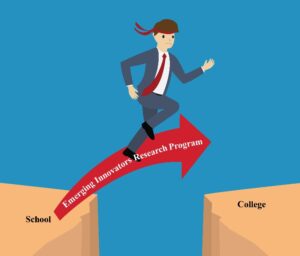Progression for High School Students - Emerging Innovators Research Program
INTERDISCIPLINARY RESEARCH PROGRAM
Learn, Discover, Innovate, Transform: The Future Starts Here!
This program is suitable for anyone above the age of 14, regardless of background, who aspires to be a change-maker and leader, is willing to take on challenging problems, and has the perseverance to strive to create solutions that will benefit humanity and the planet.
“Nurturing Young Innovators for a Better Tomorrow”
Curious to know about The Future of Scientific Discoveries? Checkout this TEDxTalk
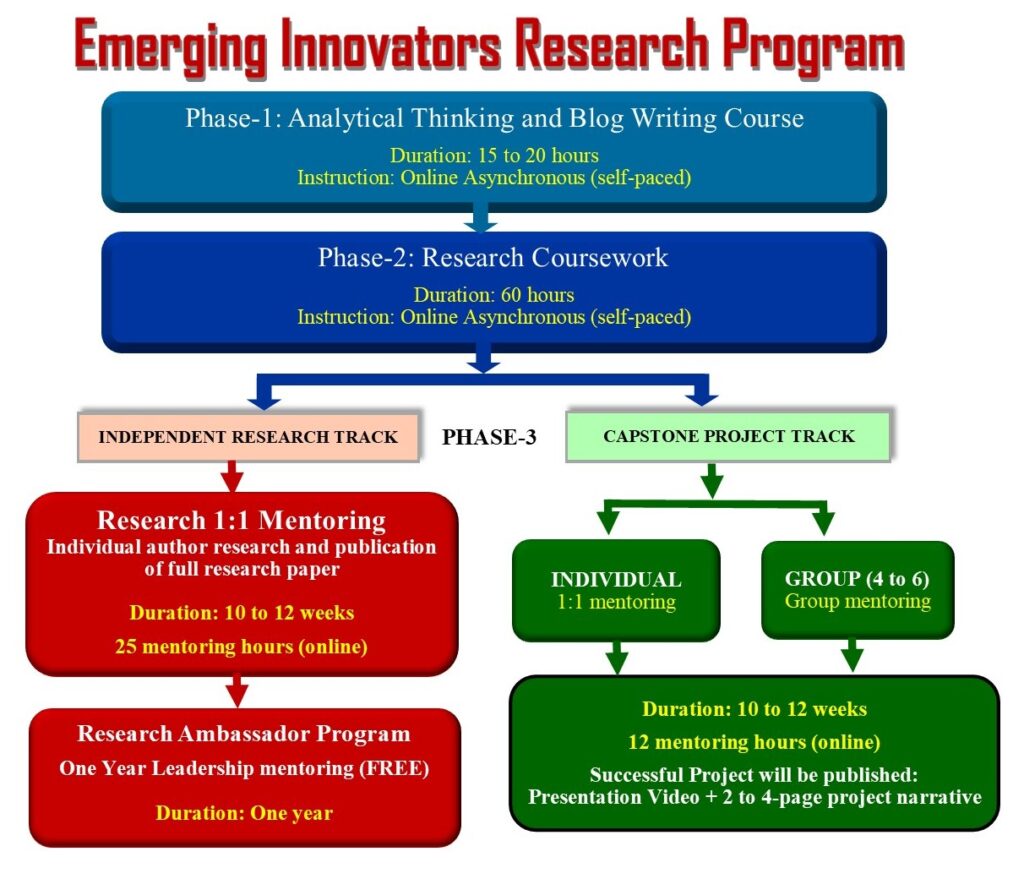
Unleash Your Curiosity, Ignite Innovation!

Emerging Innovators Research Program - Progression/Steps for High School Students
Prerequisite-Phase 1: Analytical Thinking and Blog Writing Course
- Format: Online – Asynchronous
- Time Required: 15 to 20 hours
- Course Access: 1 month
- Graded: Yes Cost: $200
- Description: This course helps develop your analytical thinking skills and guides you through the process to conduct an investigation on any topic of your interest and the writing process to help you effectively communicate your findings and analysis through a meticulously crafted blog post. This on-demand asynchronous course is divided into six units, and each unit focuses on building specific thinking skills, followed by practice assignments for each unit. The assignments will be manually graded by an instructor and feedback will be given to the student.
- More Details & Registration Link: https://childrensinnovationcenter.org/analytical-thinking-blog-writing/
Phase 2: Emerging Innovators Research Coursework
- Format: Online – Asynchronous
- Time Required: 60 hours
- Course Access: 3 months
- Graded: Yes Cost: $499
- Description: The Emerging Innovators Research Coursework is a unique interdisciplinary course that aims to educate and foster innovation in students. As Deba Dutta, provost and executive vice president for academic affairs and diversity at Purdue University, stated, "Innovation cannot be taught like math, writing, or even entrepreneurship. But it can be inculcated with the right skills, experiences, and environments." The program is designed to teach students new methodologies to make new scientific discoveries and convert those discoveries into applied science. Students also learn industry best practices for designing a product/solution to a real-world problem, exposing them to many different industry verticals and the opportunities. The program also offers activities that encourage disruptive thinking and develops critical skills in an interdisciplinary setting.
- More Details & Registration Link: https://childrensinnovationcenter.org/research-coursework/
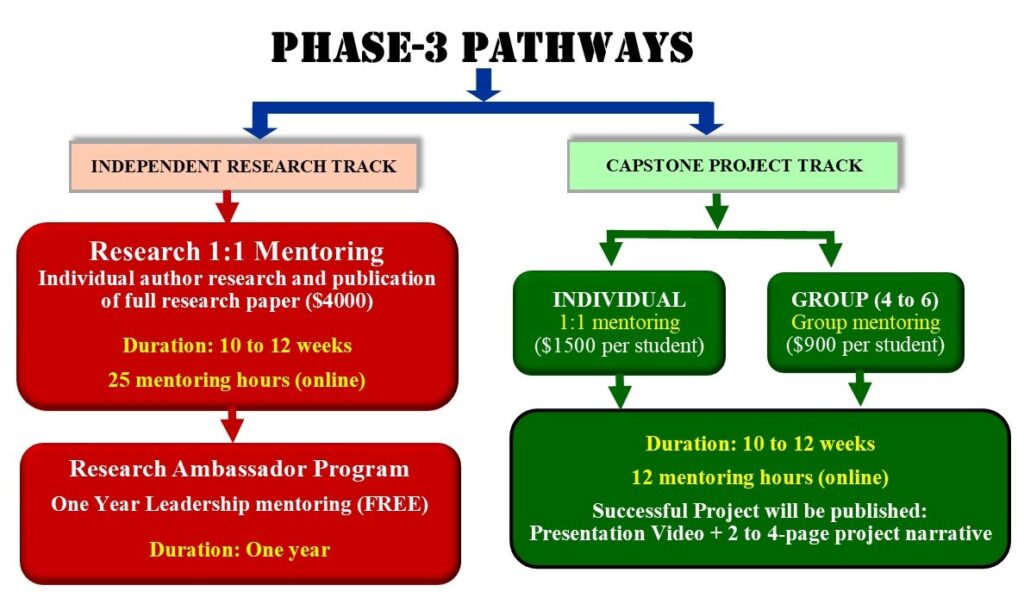
PHASE-3: Students are challenged to apply the new methodologies they have learned in the prior phase, make new discoveries, and generate new ideas. They will then abstract scientific and design strategies from their discoveries and use that knowledge to design a product or solution to a real-world problem. The program encourages disruptive thinking, giving students the opportunity to have their own "Eureka" moment.
Students can choose either the Independent Research Track or the Capstone Project Track.
The full transformative experience happens only when you apply the new concepts to solve real-world problems. Though it is an intense brain exercise, it is the most fulfilling and empowering experience.
Phase 3: Independent Research Track
- Format: LIVE online 1:1 mentoring and self-learning
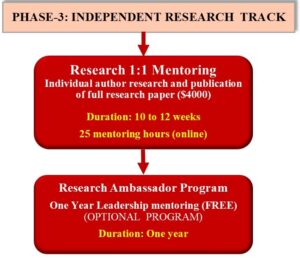
- Time Required: about 20 hours per week for 10 to 12 weeks
- Course Access: 4 months Cost: $4000
- Description: Students are challenged to apply the new methodologies they have learned in the prior phase, make new discoveries, and generate new ideas. They will then abstract scientific and design strategies from their discoveries and use that knowledge to design a product or solution to a real-world problem. The program encourages disruptive thinking, giving students the opportunity to have their own "Eureka" moment. Students are guided at every step of the way to ensure their research and scientific writing is of college-level quality. The research article is prepared for submission and review for publication following all necessary requirements.
- More Details & Registration Link: https://childrensinnovationcenter.org/mentoring-research-program/
Phase 3: Capstone Project Track
- Format: LIVE online 1:1 or Group (4 to 6) mentoring and self-learning
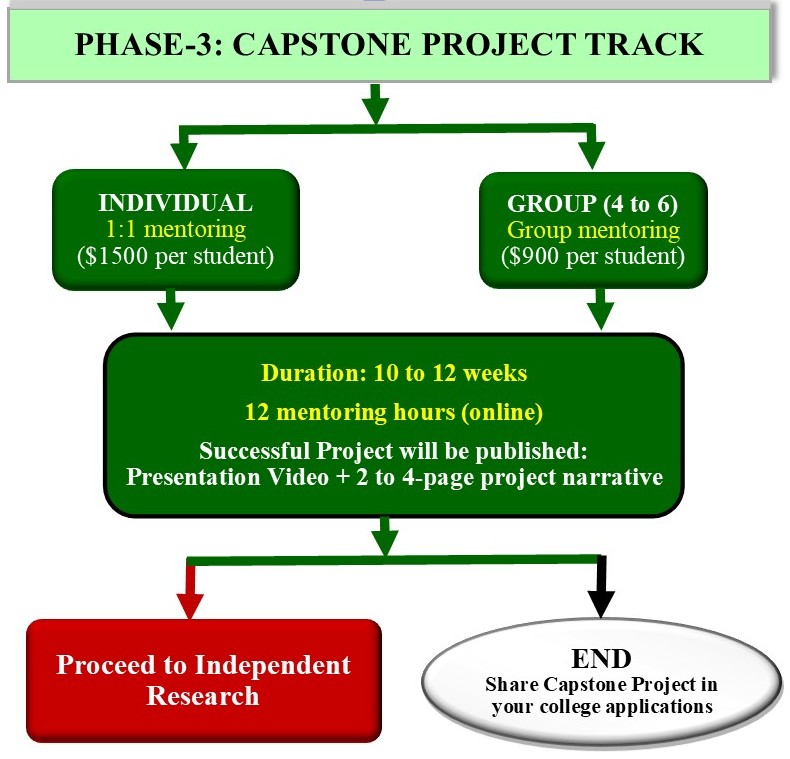
- Time Required: about 10 hours per week for 10 to 12 weeks
- Course Access: 4 months
- Description: Students are challenged to apply the new innovation methodologies they have learned in the prior phase to design a sustainable solution to a real-world problem (preferably from their local community). The program encourages disruptive thinking, giving students the opportunity to be the change-maker. Students are guided at every step of the way to ensure their project is of college-level quality.
- More Details & Registration Link: https://childrensinnovationcenter.org/capstone-project/
Research Article / Capstone Project Publication:
Students are guided at every step of the way to ensure their research and scientific writing is of college-level quality and meets all publication guidelines. All submissions go through a strict review process for scientific accuracy, quality, originality, and must address a real-world problem. There are two categories of publications by the Emerging Innovators Online Science Journal.
- Individual author research articles with novel ideas (Full Research Paper)
- Group/Individual capstone projects that demonstrate innovative sustainable solutions (presentation video with a 2 to 4-page narrative).
Journal: Emerging Innovators – Online Science Journal Journal Link: https://emerginginnovators.org/
It is noteworthy that only novel insights/solutions are published in this journal. Getting published in this journal clearly demonstrates that the research is unique and follows the scientific process for proposing novel insights. This will provide students with a valuable research/project publication to include in their resumes and in their college applications.
Students sharing their experiences in their own words.
What’s Next?
The Research Ambassador Program encourages students who have successfully completed the research publication to continue their passion by presenting their research at scientific conferences and leading research and innovation clubs at schools. This helps to promote research and innovation among their peers and the broader community.
Program URL: https://childrensinnovationcenter.org/research-ambassador/
Being a Research Ambassador has many benefits. One of the key benefits is the opportunity to enhance your communication and leadership skills by presenting your research at scientific conferences and promoting research and innovation activities among your peers and the broader community, for example through leading research and innovation clubs at schools. Additionally, the program offers volunteer hours for your efforts to promote scientific research and investigation, which can be a valuable addition to your college applications. Furthermore, you will have the opportunity to inspire others by sharing your story of how you took your research skills to the next level and pursued higher opportunities. You will also receive a letter of recommendation which will be submitted directly to the college application. Overall, being a Research Ambassador is a great way to gain valuable skills, experience, and recognition for your hard work and dedication to science research.
Children’s Innovation Center – Educate to Innovate:
URL: https://childrensinnovationcenter.org/
Children’s Innovation Center supports diversity, equity and inclusion in science and engineering education and research.
This program offers an advanced learning opportunity and introduces a new methodology that is being adopted by Industry Research Centers and is typically only available at elite universities at the Masters and PhD levels. However, through this program, it is made accessible to all high school students, college students, and adults.
The Emerging Innovators Research Program addresses community needs by fostering innovation and entrepreneurship, addressing real-world problems, developing future leaders, building a skilled workforce, and fostering collaboration between students, industry leaders, and community members. Through advanced coursework, mentoring, and research and innovation opportunities, the program aims to prepare students to be valuable assets to the community and create solutions to the challenges it faces.
Instructor and Mentor:
Shanti Balaraman is the co-founder and CEO of the Children's Innovation Center and serves as the main mentor for the Emerging Innovators Research Program. She is a leading researcher, innovator, and thought leader in the field of transformative education and disruptive thinking. Shanti has a proven track record of developing sustainable solutions and fostering the next generation of leaders and change-makers through her research and innovative approach to education. Additionally, she has a wealth of experience in the technology industry and her current role as President of the Stanford University Chapter of Sigma Xi - The Scientific Research Honor Society. She is dedicated to promoting research in science, and helping students build the skills needed to conduct scientific research and develop innovative solutions to solve real-world problems.
Emerging Innovators – Online Science Journal:
URL: https://emerginginnovators.org/
The Emerging Innovators online science journal is a new initiative that aims to address the decline of disruptive science by providing high school students with the opportunity to publish their own novel ideas and insights. The journal only publishes articles that address real-world problems and have the potential to benefit humanity and the planet. This is a unique opportunity for high school students to gain recognition for their innovative thinking and research, and to contribute to the scientific community. The journal is a response to the decline of disruptive science, which has been in decline for the past 60 years, and is a challenge faced by the scientific community. The Emerging Innovators online science journal aims to bring focus to the importance of novel insights in science and to recognize them as a separate category, distinct from articles that test existing paradigms.
Emerging Innovators Research Publication - Online Science Journal
High School Students Research Articles reviewed by professionals (not peer reviewed) and then published.
Reporting this program in the College Applications:
This precollegiate Emerging Innovators Research Coursework can be reported under "Other Coursework" or "Educational Preparation Program" in the UC applications. In the CommonApp it will come under "Research".
This university level research work with mentoring, Emerging Innovators Research 1:1 mentoring can be listed as Research in the CommonApp, and Educational Preparation Program in the UC applications.
The Capstone Project and Research Publication adds further value to the student's profile. Beyond the reporting of the program itself, students write about the experience and skills gained through this program in their college essays. IT HELPS to STAND-OUT!
FAQ - Frequently Asked Questions:
Q: Can anyone outside of Children's Innovation Center publish through the Emerging Innovators Journal?
A: Yes, as long as they meet the eligibility and publication guidelines and follow the submission process.
Q: Why don't I see many publications on this journal?
A: The journal only publishes novel scientific insights and ideas, which are rare. The Children's Innovation Center has successfully taught students how to make new discoveries and apply a whole-system design thinking methodology to create sustainable and human-centric solutions to real-world problems.
Q: Is Emerging Innovators Journal being managed by Children’s Innovation Center?
A: No. However, Shanti Balaraman is one of the lead scientists involved in this initiative that is managed by a small team of scientists aspiring to reverse the decline in new scientific discoveries[1].
Reference: 1. Park, M., Leahey, E. & Funk, R.J. Papers and patents are becoming less disruptive over time. Nature613, 138-144 (2023). https://doi.org/10.1038/s41586-022-05543-x
At the International Forum on Research Excellence - 2023
#IFoRE23 #DisruptiveThinking #breakthrough #science #innovations

